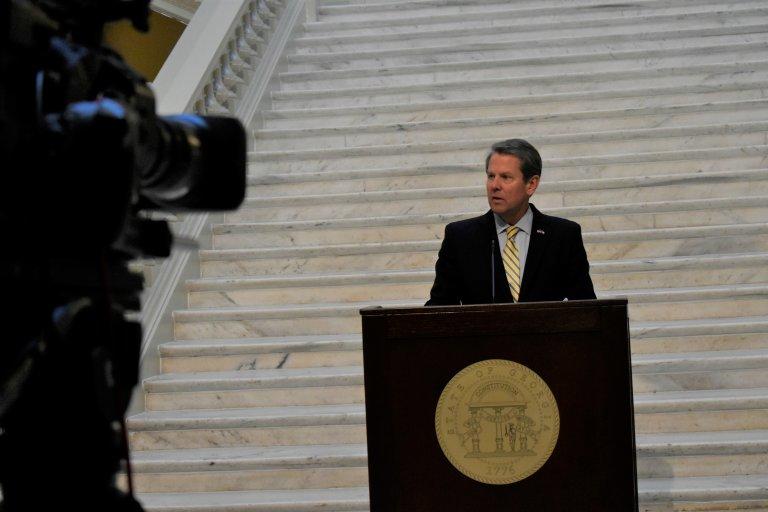
Caption
Gov. Brian Kemp balked at wording in the $1.9 trillion relief package that says the federal funds cannot pay for tax breaks.
Credit: Ross Williams/Georgia Recorder

Gov. Brian Kemp balked at wording in the $1.9 trillion relief package that says the federal funds cannot pay for tax breaks.
High-ranking GOP state officials are objecting to a provision in the $1.9 trillion coronavirus relief bill that blocks them from using the federal funds to pay for tax breaks.
The sweeping relief measure, which includes $1,400 direct checks for many Americans, is on its way to President Joe Biden’s desk after getting final approval Wednesday from Congress.
The proposal will send $8.9 billion to the state, cities and counties, but Gov. Brian Kemp and House Speaker David Ralston are balking at wording that says the federal funds cannot pay for tax breaks.
“Democrats in Washington and in the White House are not going to tell me, or the Georgia General Assembly, that we can’t cut taxes for hard-working Georgians,” Kemp said at a press conference Wednesday on the state’s vaccine rollout.
Ralston, a Blue Ridge Republican, wrote to the state’s congressional delegation members before Wednesday’s vote and then quickly fired off a letter to the president when the bill cleared the House on a party-line vote.
The speaker wrote that he was especially concerned about what the federal action would mean for state legislation that would raise the standard deduction, resulting in a small tax break. The bill, which found bipartisan support and passed the House unanimously this month, would cost the state treasury about $140 million.
“This method of cutting taxes would benefit taxpayers who do not itemize and are generally of lower to middle incomes,” Ralston wrote. “In Georgia, we have prioritized providing tax relief to our citizens, and (the bill) appears to prohibit that relief.”
Ralston asked the president to insist Congress fix the “flaw.”
The tax break would save married couples about $63 and single people about $46, according to the Georgia Budget and Policy Institute. The savings would be about $75 for Georgians who are blind or disabled.
The think tank is encouraging state lawmakers to instead pursue economic payments to households through an earned income tax credit, which the organization says would cost the state about the same and deliver up to $500 per family.
“We understand and appreciate the desire to give relief to struggling Georgians by raising the standard deduction,” said Danny Kanso, a policy analyst with GBPI. “However, though the bill will allow Georgians to save up to $75 per year in taxes and make a much-needed upward adjustment to the state’s low standard deduction, more is needed to move the needle for working families.”
Kemp also decried the funding formula used for the latest round of relief because he says it shortchanges Georgia since it mostly ties funding to a state’s unemployment rate. Georgia suffered historic unemployment claims early in the pandemic, but it’s unemployment rate — 5.6% in December — has since fallen below the national average of 6.7%.
The dire predictions about the state’s revenues, which drove $2.2 billion in budget cuts last year, have also not materialized. Revenues have been growing instead of declining.
And the governor’s office announced Wednesday a massive 43% jump, or a $581 million increase, in last month’s revenues over last year, although a federally directed delay in issuing tax refunds this year likely skewed the numbers.
The governor, who is under pressure to restore the budget cuts made last year, still sounded a cautious note Wednesday. State lawmakers are working on a spending plan for next year that would take effect in July.
“Given the unprecedented and unpredictable nature of a global pandemic, federal aid, tax refunds, unemployment payments and a host of other issues that can potentially impact the state budget, there’s still a lot of uncertainty when it comes to state revenues through the end of this fiscal year and in the next,” Kemp told reporters at a Capitol press conference Wednesday.
This story comes to GPB through a reporting partnership with Georgia Recorder.